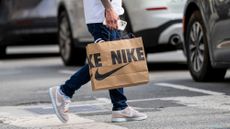Steve Jobs, and the perils of being a corporate visionary
Jobs may have changed the world. But he also indulged in some of the worst aspects of corporate capitalism.


Four years after his death, the riddle of Steve Jobs still haunts us.
A new, ruthlessly penetrating documentary by Alex Gibney literally concludes with Jobs' shadowy face staring out from the black surface of an iPhone. A new biopic — put together by a team of cinematic heavy hitters — will land next month. Between the two of them, we're all once again wondering what to make of the famously mercurial and difficult founder and CEO of Apple.
Back in 2014, Vanity Fair interviewed Jonathan Ive, a widely respected designer at Apple and Jobs' personal friend. When asked what life lessons he'd learned from the man, Ive recounted an incident in which Jobs was especially brutal with his criticism of some employees. So Ive pulled his friend aside to encourage him to take it easy:
Subscribe to The Week
Escape your echo chamber. Get the facts behind the news, plus analysis from multiple perspectives.

Sign up for The Week's Free Newsletters
From our morning news briefing to a weekly Good News Newsletter, get the best of The Week delivered directly to your inbox.
From our morning news briefing to a weekly Good News Newsletter, get the best of The Week delivered directly to your inbox.
And [Jobs] said "Well, why?" And I said, "Because I care about the team." And he said this brutally, brilliantly insightful thing, which was, "No Jony, you're just really vain. You just want people to like you. And I'm surprised at you, because I thought you really held the work up as the most important, not how you believed that you were perceived by other people." [Vanity Fair]
Consider for a moment the poisonous acid of Jobs' logic. It is surely true that vanity could motivate managers to be less demanding or cutting with their team. But empathy could motivate them as well. To throw that out as vanity is to throw out the possibility for empathy along with it. Ive's story reveals Jobs couldn't tell the difference between the two.
Apple under Jobs indulged in some of the worst aspects of corporate capitalism, as Gibney recounts in his documentary. Jobs colluded with other tech overlords to hold down employee wages in Silicon Valley; he made probably illegal use of stock backdating to get big payouts for himself and others at Apple; and of course there were the countless Chinese workers made to endure low pay, wage theft, and brutal conditions in the globe-spanning manufacturing apparatus that puts together the iPhone, the iPad, and most other Silicon Valley toys.
Gibney also revisits a brutal moment from Jobs' youthful days working for Atari with Steve Wozniak, Apple's eventual co-founder. After putting in four all-nighters to create a video game, Atari paid the pair a $5,000 bonus. Jobs told his friend it was a $700 bonus, and cut Wozniak a check for $350.
But watching Gibney's film, the wage collusion and stock backdating seem more about keeping together, and then properly rewarding, the top technicians and artists at Apple — Jobs' "family," as he referred to them. In contrast, when confronted about worker suicides at Foxconn, the gargantuan Chinese manufacturer, Jobs' main reaction seems to have been annoyance that people weren't paying more attention to how awesome Apple's products were.
So it doesn't seem like money was everything for Jobs. He really did successfully combine function with beauty in a way the world hadn't seen before. He called the personal computer "a bicycle for your mind," and when he talked to Ive about valuing "the work" above all, Jobs really meant it. When Ive himself described Apple's work — making tools that make life easier — as "noble," he wasn't exactly wrong.
That's why thousands of people the world over grieved when Jobs died. This is also why, when a commercial implicitly connected Apple's work with the Civil Rights Movement, peace activism, and scientific genius, lots of people could digest it un-ironically.
And this, I think, gets us close to the dark heart of the mystery that is Steve Jobs.
We tend to think that greed is the worst and most destructive aspect of human nature that capitalism risks unleashing. If left unchecked by taxes, laws, or regulations, greed will drive the wealthy and powerful to exploit their workers, trample the poor, and despoil the environment. Vision, ambition, drive, focus, intelligence, and imagination — these things we think of as virtues. But what Jobs revealed was that there's nothing binding those supposed virtues to any moral constraint. And if they're left completely unbound, the costs for the world can be as terrible as those of any purely greed-driven enterprise.
In fact, the mysticism of things that matter "more than money" can be a cudgel held over workers' heads: your pay, your hours, your working conditions, your life outside the job — those are lowly concerns. The vision of the company and the drive to accomplish something great — those are high concerns.
Andrew Ross Sorkin of the New York Times rightly observed that Jobs' flaws and demons were hardly unusual among famous and powerful people. But this just pounds home that we're often incapable of morally policing ourselves in how far we should take our grandiose visions — as Ive's anecdote about Jobs shows. The only reliable route to just social and economic endeavors — ones that combine vision with moral awareness — is to balance power with power. People need to be able to tell one another "no," and to be able to exit projects they don't wish to be involved in.
But when you've amassed as much wealth and power as Steve Jobs, there's almost no one who can effectively tell you "no." Within your bubble, the costs to other people of enacting your vision can remain safely off your radar. And in a social order where the loss of a job can mean the loss of livelihood, social standing, shelter, health care, financial security, and even three square meals a day, people often have no exit.
That's why unions, full employment, and the general push to keep the distribution of wealth and income as egalitarian as possible are all of such vital moral importance. These institutions give everyday people a veto — or at least an exit— in the projects their society takes on.
Which gets to what's unnerving about the widespread acclaim for Jobs, and what we seem unable to realize about him: Just because someone doesn't care about money, doesn't mean they adequately care about people.
Sign up for Today's Best Articles in your inbox
A free daily email with the biggest news stories of the day – and the best features from TheWeek.com
Jeff Spross was the economics and business correspondent at TheWeek.com. He was previously a reporter at ThinkProgress.
-
 'There is a lot riding on the deal for both sides'
'There is a lot riding on the deal for both sides'Instant Opinion Opinion, comment and editorials of the day
By Justin Klawans, The Week US Published
-
 Pharaoh's tomb discovered for first time in 100 years
Pharaoh's tomb discovered for first time in 100 yearsSpeed Read This is the first burial chamber of a pharaoh unearthed since Tutankhamun in 1922
By Peter Weber, The Week US Published
-
 Microsoft unveils quantum computing breakthrough
Microsoft unveils quantum computing breakthroughSpeed Read Researchers say this advance could lead to faster and more powerful computers
By Rafi Schwartz, The Week US Published